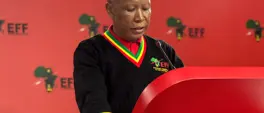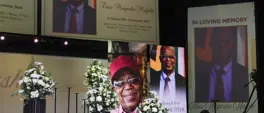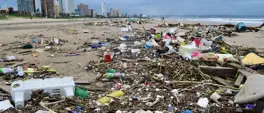YONELA DIKO: ANC@113 - The organisation should be proud of its record
Yonela Diko
9 January 2025 | 8:45Whatever the shortcomings the ANC has had, whatever counter-revolutionary forces the party has had to battle over the last 30 years, the party is still here, beaten but unbowed, proud of its record, and still capable of achieving remarkable things, writes Yonela Diko.
In 1994, the African National Congress (ANC) faced the herculean task of building a new nation out of the ruins and broken pieces of our native land, with our people scattered across many divides, oceans and multiple borders against their own will.
New institutions had to be built, new laws had to be enacted, and bantustans had to be abolished.
Many of our people, ill-fed and ill-clad, worn out by a lifetime of battle, even for small things such as consistent, warm meals, a house, a job, clean water, and a decent education. No man should ever spend a lifetime in battle just so he could have such basic physiological needs. We needed a better life for all.
The ANC immediately went to work.
By the ANC’s 25th year of governing, as President Cyril Ramaphosa delivered the party’s manifesto, he captured the successes of the 25th year of ANC in government succinctly.
He reminded the country of how far we had come, with 16.7 million people employed, from less than eight million in 1994, which meant the ANC had achieved in 25 years what the colonial and apartheid government could only manage in 350 years.
Access to electricity was available to only 36% of our people, and even less to those in rural areas at 12%, in 1994. The country was now above 80% of people with access to electricity in their homes, including those in rural areas.
Even a natural need such as water was not easily met by the old apartheid government, with only 6 out of 10 of our people having access to clean drinking water. Today, over 90% of our people have access to clean water.
The President further highlighted that the ANC government had built 3.2 million free houses, which were housing over 14 million people.
The records were equally impressive on literacy numbers, no fee-paying schools, and school attendance, the National Student Financial Aid Scheme, life expectancy, tripling the size of the economy, rising black middle-class thanks to ANC policies of affirmative action, black industrialisation, broad-based black economic empowerment and gender equality.
The ANC has also had remarkable successes in its foreign policy, which has been grounded on human rights as its guiding light. The ANC government party has been out in the world, getting rich countries to pardon debts of poorer countries, fighting against the global sale of conflict diamonds, and standing up to more powerful countries who use their might and control over international institutions to violate the rights of others.
As with all important nation-building projects, it has not been perfect. This has been the primary focus of all the doomsayers, who predicted even before 1994 that a black government would fail, and then went on to comb through every decision, every policy, every programme, and every project, looking for failure, using their ownership of the tools of propaganda to scream the failures the loudest and mute the successes.
Still, with all these recorded successes, one wonders why the narrative about the ANC has been that of failure, incompetency and corruption. According to author Jonah Berger, “People don't think in terms of information. They think in terms of narratives".
This means that enemies of the ANC who have never wanted to see a black government succeed did not have to battle the ANC at the information level about the party's governing record, they just needed to create a narrative of their own using inevitable mistakes of governing and massify them enough to trump all information of good delivery.
Former Minister of Intelligence Ronnie Kasrils remembers how the media in 1994 seemed to have adopted this bee in the bonnet towards the new government ministers, following them around, looking for which houses they were living in, the cars they drove, even where they bought curtains for their new homes, so they could scream extravagance and corruption on their papers, make their little apologies when confronted, then do it again - as if the aim was to throw as much mud and long enough until it stuck, and the people started believing.
Unfortunately, in the end, the people started believing it, and new leaders who came later, not fully aware of all that the new black government was up against, allowed their lapses in judgement and human frailties to corrupt them, which only played into the script that was already written for them decades earlier.
According to the Human Sciences Research Council’s Social Attitudes Survey, "The share of ANC supporters mentioning corruption as a priority rose from 6% in 2003 to 15% in 2009 and 27% in 2017.” This ties in closely with the 9% of the general population which cited corruption as a pressing challenge facing the country in 2003, rising to 18% in 2009, 24% in 2014, and 30% by the end of 2017.
This means in 15 years, mostly under Former President Jacob Zuma’s presidency, corruption moved from being ranked 8th in societal concerns among South Africans to being third, after unemployment and crime.
These perceptions of a corrupt and incompetent ANC have forced many beneficiaries of ANC policies to abandon the party as they move to new heights, where there are cultural minorities and oppressive stereotypes.
The reality, however, cannot be wished away. South Africa is the biggest economy in the continent. We sit on every important global table in the world. Being a South African is a flex on every part of the globe.
Whatever the shortcomings the ANC has had, whatever counter-revolutionary forces the party has had to battle over the last 30 years, the party is still here, beaten but unbowed, proud of its record, and still capable of achieving remarkable things.
Still, we rise.
Yonela Diko is the former spokesperson for the Minister of Human Settlements, Water and Sanitation.
Get the whole picture 💡
Take a look at the topic timeline for all related articles.
















